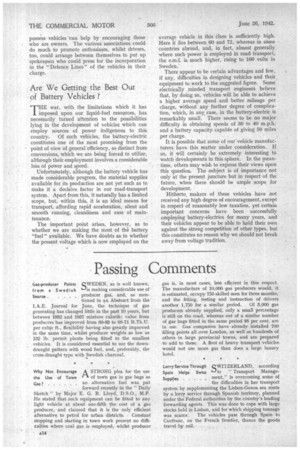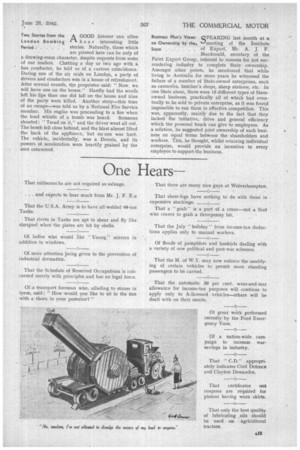Passing Comments
Page 16

Page 17

If you've noticed an error in this article please click here to report it so we can fix it.
SWEDEN, as is well known, is making considerable use of producer gas, and, as mentioned in an Abstract from the I.A.E. Journal for June, the technique of gas generating has changed little in the past 10 years, but between 1932 and 1937 mixture calorific value from producers has improved from 60-63 to 68-71 B.Th.U. per cubic ft., flekibility having also greatly improved in the same time, whilst producer weights as low as 132 lb. permit plants being fitted to the smallest vehicles. It is considered essential to use the downdraught pattern with wood fuel, and, preferably, the cross-draught type with Swedish charcoal.
Gas-producer Points from a Swedish Source.
Why Not Encourage A STRONG plea for the use the Use of Town rl of town gas in gas bags as Gas ara. alternative fuel was put
forward recently in the "Daily Sketch" by Major E. G. R. Lloyd, D.S.O., M.P. He stated that such equipment can be fitted to any light vehicle at about one-fifth the cost of a gas producer, and claimed that it is the only efficient alternative to petrol for urban districts. Constant stopping and starting in town work present no difficulties where coal gas is employed, whilst producer gas is, in most cases, less efficient in this respect. The manufacture of 10,000 gas producers would, it is estimated, occupy 750 skilled men for three months, and the fitting, testing and instruction of drivers another 1,750 for a similar period. 01 3,000 gas producers already supplied, only a small percentage is still on the road, whereas out of a similar number of gas bags fitted in the same period 95 per cent, are in' use. Gas' companies have already. installed 700 filling points all over London, as well as hundreds of others in large provincial towns, and are prepared to add to these. A fleet of heavy transport vehicles would not use more gas than does a large luxury hotel.
SWITZERLAND, according to "Transport Management," is overcoming some of the difficulties in her transport system by supplementing the Lisbon-Genoa sea route by a lorry service through Spanish territory, planned under the Federal authorities by the country's leading forwarding agents. This was done to cope with large stocks held in Lisbon, and for which shipping tonnage was scarce. The vehicles pass through Spain to Canfranc, on the French frontier, thence the goods travel by rail.
Lorry Service Through Spain Helps Swiss Supplies
Two Stories from the A GOOD listener can often London Bombing 1-1 he interesting little
Period stories. Naturally, those which are printed here can be only of a drawing-room character, despite requests from some of our readers. Chatting a day or two ago with a bus conductor, he told us of a curious coincidence.' During one of the air raids on London, a party of drivers and conductors wAs in a house of refreshment. After several rounds, the proprietor said: " Now, we will have one on the house." Hardly had the words left his lips than one did fall on the house and nine of the party were killed. • Another story—this time of an escape—was told us by a National Fire Service member. His engine was proceeding to fire when the loud whistle of a bomb was heard. Someone shouted: "Tread on it," and the driver went all out. The bomb fell close behind, and the blast almost lifted the back of the appliance, but no one was hurt. The vehicle, incidentally, was a Dennis, and its powers of acceleration were heartily praised by the men concerned.
Business Man's Views QPEAKING last month at a on Ownership bk the. 1-71meeting of the Institute State of Export, Mr. A. J. F.
Macdonald, secretary of the Paint Export Group, referred to reasons for not surrendering industry to complete State ownership. Amongst other points, he mentioned that while living in Australia for some years he witnessed the failure of a number of State-owned enterprises, such as canneries, butcher's shops, sheep stations, etc. In one State alone, there were 15 different types of Stateowned business, practically all of which had eventually to be sold to private enterprise, as it was found impossible to run them in effective competition. This was, apparently, mainly due to the fact that they lacked the initiative, drive and general efficiency which the personal touch can give to employees. As a solution, he suggested joint ownership of each business on equal terms between the shareholders and workers. This, he thought, whilst retaining individual enterprise, would provide an incentive to every employee to support the business.




















































